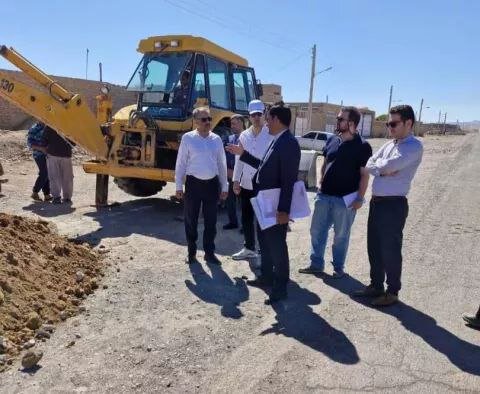Ministry of Energy UNICEF to improve water supply to South Khorasan
Ministry of Energy, UNICEF to improve water supply to South Khorasan
TEHRAN –The Ministry of Energy, in cooperation with the United Nations Children’s Fund (UNICEF), has enhanced water quality and ensured consistent access to water with adequate flow pressure for households by supporting the construction and rehabilitation of the water network in eastern Birjand’s villages in South Khorasan province.

Completed in December 2024, this initiative included the establishment of a new water distribution network in Dastgerd and Islamabad, connecting these villages to the main network in Darmian County, UNICEF website announced in a press release on January 20.
The project focused on rehabilitating and replacing outdated and non-functional infrastructure with high-quality materials, ensuring a sustainable water supply for the community.
These improvements have led to significant reductions in water loss from leaks, enhanced water quality, and ensured consistent access to water with adequate flow pressure for households.
Additionally, the intervention has drastically decreased the number of water-related incidents, leading to significantly lower maintenance costs. As a result of these significant enhancements, the consumers’ satisfaction has greatly improved.
This effort directly benefits 1,729 individuals including children, enhancing community resilience and preventing environmental migration. It also promotes financial development, reduces water loss, and mitigates the risk of water borne diseases.
Given the success of this project in improving the water supply through decreasing water loss in the network, UNICEF, in collaboration with the Ministry of Energy, plans to launch a pilot programme in the province to compare the efficiency of this method versus other usual water supply methods. This pilot programme will compare the efficiency of reducing water loss versus the financial and environmental costs of water transfer from new and distant water resources, as a usual practice.
By tackling the critical issue of water scarcity, this project not only enhances the quality of life for residents but also fosters long-term sustainability in the region.
Improving access to safe water
Following the devastating floods that struck Sistan-Baluchestan province, specifically in Chabahar and its vicinity, at the end of February 2024, the United Nations Children’s Fund (UNICEF) has been providing critical assistance, including access to safe water, to the affected communities.
Access to clean and safe water has long been a challenge in the region, even before the floods.
Recognizing the urgent need to address this hazard, UNICEF in collaboration with the Ministry of Health and Medical Education and the Ministry of Energy, initiated a comprehensive program to improve access to safe water, the UNICEF website announced in a press release on December 22, 2024.
This initiative aims to reduce waterborne illnesses, protect vulnerable families, and build resilience in the region’s communities, ensuring sustainable access to clean and safe water.
UNICEF’s response to the water crisis included critical support for water safety testing and purification efforts. “Forty water disinfection devices have been procured and distributed. These devices, which operate on solar energy, provide drinking water for approximately 200,000 people,” explains Siavash Oveisi Arian, a UNICEF volunteer Water, Sanitation and Hygiene (WASH) officer.
“In addition, water quality testing laboratory equipment was distributed across the province,” he added.
The laboratory equipment provided by UNICEF plays a crucial role in ensuring water safety for a large population in Sistan-Baluchestan province. Fatemeh Fadaee, Water and Wastewater Quality Control Manager of Chabahar County, explains, “We assess the water quality in the cities and villages of Chabahar, Dashtiari, Konarak, Zarabad, Ghasreghand, and Nikshar, with a population of one million people, to ensure the safety and quality of the water.”
This enhanced capacity for water quality testing helps protect the health of communities across the province, reducing the risk of waterborne diseases and improving resilience against future public health challenges.
UNICEF’s support to the flood-affected children and their families in Sistan-Baluchestan, including the provision of hygiene kits, prefabricated latrines and showers, laboratory equipment, and water disinfection devices, was made possible through generous financial aid from EU Humanitarian Aid.
UNICEF responded swiftly to the humanitarian crisis in the aftermath of the floods. In the first phase, UNICEF procured 2900 essential hygiene packs including 2000 household hygiene kits, 300 baby kits, 500 Menstrual Hygiene Management (MHM) kits, and 100 incontinence kits to prevent disease outbreaks and promote children’s overall well-being, the UNICEF website reported on April 30.
UNICEF, in collaboration with the Ministry of Health and Medical Education and the Ministry of Energy, prioritized the provision of safe water and sanitation services to households and communities affected by the disaster to ensure that children and families stay safe and healthy.
UNICEF also delivered ten water tankers and over 3 tons of perchroline powder to the affected areas, ensuring access to safe drinking water. This has also been materialized through generous European Civil Protection and Humanitarian Aid Operations (ECHO) funding.
MT/MG
source: tehrantimes.com